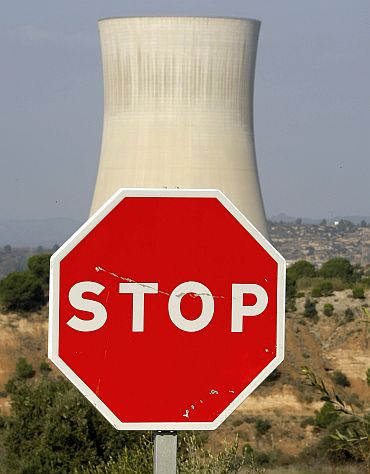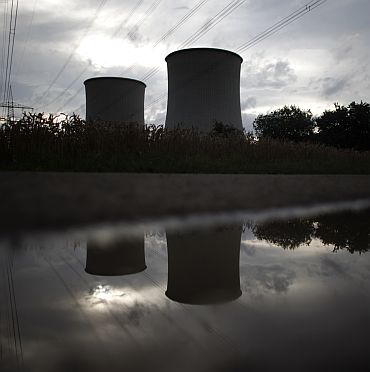 | « Back to article | Print this article |
'Bill is not in the interests of Indian public'
Liability caps can be raised without affecting the bill. Local suppliers will be the worst hit if there is no liability cap, G Balachandran observes.
It is useful to keep in mind that the proposed Civil Liability for Nuclear Damage Bill is in line with the principles followed by 28 of the 29 other nations that operate civil nuclear power plants (NPPs), including China and Russia -- the sole exception is Pakistan, which has no nuclear liability bill and, as of now, no prospects of significantly increasing its civil nuclear programme.
If you ignore the ideological campaign (that it will help only US firms) against the bill, the main reasons for opposition are: It limits the liability of the operator to Rs 500 crore and that for all the damage to 300 million SDR (Rs 2,100-2,300 crore); the public will have to bear substantial costs of damage and it exonerates suppliers of equipment from liability charges.
Well, the operator limit and total financial liability limit are subject to future amendments to the bill. Other countries, too, had frequently changed both these limits. So, the first two points of opposition can be resolved with informed debate with inputs from industry, insurers, nuclear industry experts and public interest groups. These will not require any modification to the principles of the bill.
Click on NEXT to read Greenpeace Campaigner Karuna Raina's views
What of the charge that the Indian public will bear the major share of the liability under the bill? This is true where the operator's liability will be less than the full financial liability for damages. But will the interests of the Indian public be better protected without a bill, as is the situation today? No. All NPPs are operated by public sector units today. So, in case of a nuclear mishap, it will be the government, and hence the public, that will have to bear the liability charges.
Would any private operator in India enter civil nuclear power production without a liability bill, especially with unlimited liability? Probably not. One, it is difficult to envision any Indian insurer willing to issue unlimited liability coverage for a reasonable premium, which will effectively mean bankruptcy for the private operator in case of a very serious accident, even though such an event is unlikely. Two, the public sector units operating NPPs will be exempt from taking such an insurance cover which effectively ensures the government, and hence the public, is subsiding these operators while imposing additional costs on private operators. As a result, the Indian private sector is unlikely to enter into civil nuclear power area with consequent costs on the efficiency of NPPs in India.
What about the charge that the bill exonerates the equipment suppliers from liability damages? True. It does so but without any geographical restrictions. It equally protects Indian, US and all other foreign suppliers. Would making the supplier also liable, in certain cases, be in public interest? It is debatable.
First, take the case of French and Russian suppliers. The French have repeatedly said that they require a liability bill. Indeed the Chinese put in place their liability regime in March 1986, only to address the concerns of foreign suppliers -- mainly the French, who were to work on the construction of the second Chinese NPP at Daya Bay. Notwithstanding the noises made by the critics about the French willing to supply equipment without a nuclear liability Bill, no responsible French official or nuclear supplier, such as Areva, for example, has ever made such a claim.
What about Russia? Russia is a signatory to the Vienna Convention -- it makes the operator solely responsible for liability damage. The only exception, as per the Convention, is when the operator has recourse only when this is expressly provided for by a contract in writing. That being the case, and in the absence of anything in the public domain to the contrary, it is uncertain if the Russian supplier would agree to nuclear damage liability in India in the absence of such a specific condition being part of the India-Russia agreement on Koodankulum. It would be interesting to know if the Koodankulum contract specifically addresses the issue of supplier liability.
If it does not go beyond the standard warranty clauses, then a claim against the Russian supplier will be infructuous. Thus it is most likely that even under current conditions, the Indian public will have no recourse against a foreign supplier. On the other hand since 18 of the 24 reactors currently operated by NPCIL are totally indigenous, the Indian suppliers will be liable under the existing Indian laws. It is surprising that the Indian nuclear industry has so far remained silent on this subject given that it is this industry that will be the most affected by the absence of such a bill. But that should not be surprising given the total inadequacy of the Indian industry and their chambers to respond effectively to any public issue other than excise and income taxes.
Hence, in sum, the absence of the bill will (i) not in any manner benefit the Indian public; (ii) effectively kill any chance of Indian private sector participation in Indian nuclear future programmes; and (iii) gravely damage the Indian nuclear supplier industry.
The writer is a Visiting Fellow at the Institute for Defence Studies & Analyses
'Risk of operating a N-plant is always downplayed in India'
Countries like the US have huge liability cover -- the Bill fails to ensure insurance cover for all potential damage, Karuna Raina observes.
The Civil Liability for Nuclear Damage Bill can be assessed on the basis of two concepts that would play a major role in a properly constructed policy framework: Precautionary principle and full accounting of costs (which includes the "polluter pays" principle). The bill is in disjuncture with both of them.
The bill does not require India's nuclear industry and the government to publish and disclose information relevant to nuclear risk and nuclear insurance. The risk of operating a nuclear plant is always downplayed in India, mainly because of the non-independence of the regulatory board.
Over the years, many facilities under the Department of Atomic Energy (DAE) have had accidents of varying magnitude and rather than independently looking into them, the Atomic Energy Regulatory Board (read, DAE) tries to downplay them, whether it has been the November 2009 tritated heavy water drinking incident in Kaiga or the collapse of the inner containment dome of Kaiga on May 13, 1994 -- when 130 tonnes of concrete just fell from the top of containment! This Bill nowhere guarantees full insurance coverage of off-site and on-site damages that are provided for each nuclear power plant (NPP) and other nuclear installations, premiums paid for this coverage or reinsurance arrangements.
What this regime envisages is a three-tier compensation, where in the first tier is the operator's liability: The liability of the operator is limited to Rs 500 crore, for which it would take an insurance cover. The second tier is when government steps in; the amount has been capped at 300 million SDRs (Rs 2,300 crore). The third tier is the funds that we will get once we sign the international convention, Convention for Supplementary Compensation ($450 million).
However, CSC is contentious and it is not legally enforceable -- though CSC was signed in 1997, even a decade later, it has not entered force. The CSC fund cannot be accessed till it is ratified by five countries with a minimum 400,000 units of installed nuclear capacity. As of now, only four countries have ratified it and the total nuclear power capacity of those countries is 100,000 units -- that's a shortage of 300,000 units. And even if it becomes legally enforceable, the US can go to the Dispute Settlement Mechanism (DSM) of CSC -- so if there is an incident involving the US, it can easily deny funds under this mechanism and that too legally.
Since the government has been trying to argue that the bill is in synchronisation with international best practices, why doesn't it follow the US where the insurance provides about $11 billion of coverage for damage to third parties? The US also has a system of economic channelling -- victims can initiate civil lawsuits against the operator as well as any of the other parties involved (suppliers, designers, etc.) in line with ordinary tort law. However, the operator, whose insurance needs to cover the other parties' third party liability as well (i.e. an "omnibus coverage" or "umbrella insurance"), ultimately needs to indemnify these parties. The result is similar to legal channelling in that the operator bears the financial liability burden of the nuclear accident vis-a-vis third parties.
However, economic channelling leaves the legal reality unscathed and does not set ordinary tort law aside, whereas legal channelling distorts the underlying legal construction and sidesteps ordinary tort law. The functioning of economic channelling is best illustrated by the Three Mile Island accident of 1979, where all defendants -- the operator, the designer and the constructor of the plant -- were represented by a single law firm. In Germany, there is no limit on an NPP operators' liability for damage to third parties.
Also, the bill does not ensure risk costs of operating each NPP as cost of production. Studies around the world show that the off-site health cost could exceed this amount and the victims cannot even get compensation, since the burden of proof lies on them. The risk cost far exceeds the insurance premium. There is no other way of accounting risk cost as production cost. Thus most of the risk cost has been borne by public and, therefore, is a huge subsidy to the nuclear industry. It has been almost 40 years of nuclear power in India -- if the industry cannot thrive competitively, then there are serious questions to be answered.
The economics of nuclear power does not add up if its subsidies are cut. The government in India has given subsidies in myriad forms to the nuclear industry, in the form of the ownership of subsidised nuclear fuel chain facilities, government-funded nuclear decommissioning and waste management. Given this context and the role of the bill in subsidising nuclear power in India and giving profits to foreign firms, the government and the proponents should acknowledge that the Bill provides a subsidy, and, they, therefore, need to justify that subsidy and provide a robust reasoning for it.
The writer is an Greenpeace campaigner with a focus on nuclear energy


